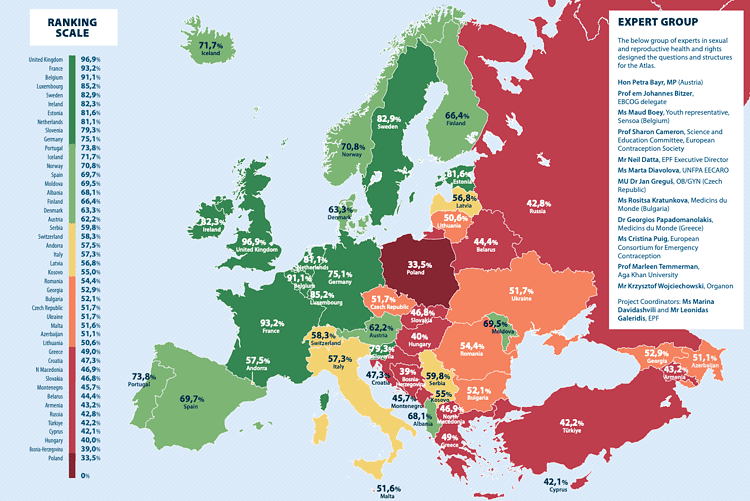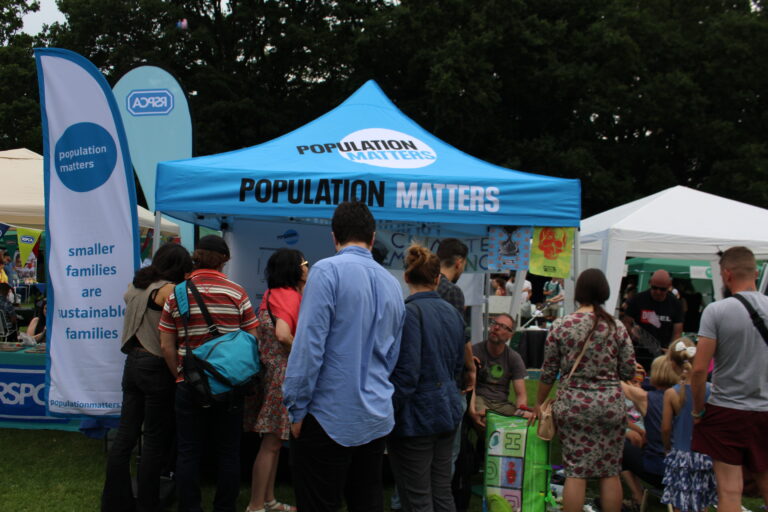
Polarised access to contraception in Europe
Each year the European Contraception Policy Atlas is published by the European Parliamentary Forum for Sexual & Reproductive Rights (EPF). Last week, their 2023 version was released and we were in (online) attendance at the launch event in the European Parliament.
The EPF European Contraception Policy Atlas is an annual report that monitors access to modern contraception in the continent. The report ranks 46 countries, looking at access to supplies, access to counselling and the availability of online information, with each country given a percentage score.
The best three performing countries are the UK, France and Belgium while the bottom three are Poland, Bosnia & Herzegovina and Hungary, which will come as no surprise to those who have been tracking pronatalist-government policies around the world on our Gilead Watch page.
Access to contraception should be a key concern of governments in empowering citizens to plan their families and lives.
EPF
CLEAR DIVISIONS
A brief glance at the map below shows a clear distinction between the rankings of Eastern and Western Europe. Western & Northern Europe is covered in green, indicating mid-high scores on the ranking scale whereas the orange and red seen in Eastern Europe show poor performance.

“We can see an increased polarisation between East and West Europe”, said EPF Executive Director Neil Datta, while pointing out that countries in Western Europe have been improving in the last two years, while those in Eastern Europe have largely remained the same.
France (93.2%) has introduced free emergency contraception for everyone, adults and minors, and free condoms for everyone under 26. Ireland (82.3%) has started a “free contraception for youth” programme for 17-26-year-olds, which will extend to 30-year-olds later in the year.
Conversely, in Armenia (43.2%) a scheme providing contraception for vulnerable groups has disappeared and there is a dearth of online information. In Turkey (42.2%) consultations have become less accessible and the government website has completely disappeared.
The better-performing countries have general coverage schemes within the national health service, special arrangements for young and vulnerable people, accessible and free consultations and excellent government-supported websites. The poorer performers have no coverage within the health systems, consultations that are not or are insufficiently covered by the health system and no government-supported websites.
Did you know that 36% of pregnancies in Europe are unintended? And that 28 European countries offer little or no reimbursement for contraception?
The Panel
For the final segment of the event, the microphones were turned over to three voices from across Europe to talk about something personal to them, whether that be the state of play in their home countries or more general.
First was Senator Pauline O’Reilly, Irish Senator and Chair of the Green Party. She spoke about some of the important advancements that have been made in Ireland in a relatively short time, which has seen it jump up the Atlas rankings by 15% into the top four. These include the same-sex marriage referendum in 2015 and abortion being legalised in 2018, which also significantly improve access to contraception.
Next to speak was Dr Jan Greguš, a Czech academic and medical doctor. He noted that the situation in the Czech Republic is quite stable, but wanted to talk more generally, making it clear that access to modern contraception is a human right and must be viewed as such. He also spoke about tactics, explicit and subtle, used to undermine access to contraception, such as creating prejudice and spreading misinformation.
Access to modern contraception is a human right. It can be undermined, and it is, by financial and economic barriers. Here (Europe) reimbursement and coverage of contraception within national healthcare systems is the best solution.
Dr Jan Greguš
The final speaker was Rositsa Kratunkova, Advocacy Officer of Bulgaria Medicins du Monde, who spoke about the issue in her country. Bulgaria has the most significant income inequality in the EU, mirrored in the inequality of access to contraception. Not only is there a general lack of clear information, but the poorest cannot access contraception because it is not free. This leads to a higher proportion of unintended pregnancies among this socio-economic group, who are then priced out of abortion access as it is prohibitively expensive.
What happens next?
While there have been significant improvements to the information and contraceptives that those living in Western Europe are able to access in recent years, Ireland being a prime example, the situation in Eastern Europe is far less rosy. We have documented some of the pronatal policies that some of their governments engage in on our Gilead Watch page but we can also see that in certain countries where modern contraceptives are not included within the healthcare system, some groups are priced out of access.
Reports such as the European Contraception Policy Atlas do a great job of highlighting the issue, but what next? While Poland came out bottom of the pile (33.5%), it was good to hear that Neil Datta has been invited to present his findings to the Polish Parliament. We can only hope that engaging in such a dialogue with decision-makers helps to improve contraception access there.



